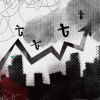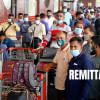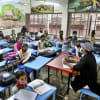High Inflation: Worrying but under control

"We are worried... However, inflation is under control. We are moving forward with a flexible approach to contain high inflation. We will try to resolve the problems that have stoked it."
Finance Minister AHM Mustafa Kamal yesterday said that though he is worried about the elevated level of consumer prices, the situation is still under the government's control.
"We are worried ... However, inflation is under control. We are moving forward with a flexible approach to contain high inflation. We will try to resolve the problems that have stoked it."
His assurances came at a post-budget press conference at the Bangabandhu International Conference Centre in Dhaka.
Kamal has targeted to bring down the average inflation to 6 percent in the next fiscal year of 2023-24.
But his target has been described as unrealistic as inflation averaged 8.64 percent in April, which is nearly three percentage points higher than a year ago.
Furthermore, the factors behind the rise in inflation, such as a surge in import bills, energy shortage, the US dollar crisis, and market imperfections, are still there.
In 2009, inflation stood at 12 percent but it was kept below 6 percent in the next decade, said Kamal.
"The whole world is going through a difficult time. We are tackling the situation."
According to Kamal, the International Monetary Fund (IMF) has also said inflation will decline in the coming fiscal year.
"Oil prices are falling in the global markets. The government has signed agreements to purchase liquefied natural gas. So, uncertainty over the energy supply is not there.
"The prices of goods are falling as well. So, the targets outlined in the budget will be achieved," said the minister.
The new budget has set a deficit financing target of Tk 261,785 crore. Of the amount, Tk 132,395 crore will come from the central bank, a move that analysts say will crowd out the private sector, stoke inflationary pressures and put the foreign currency reserves under further strain.
But Bangladesh Bank Governor Abdur Rouf Talukder ruled out the possibility of a further rise in inflation.
He explained Bangladesh Bank has injected 20 billion US dollars in the market in the last two years, meaning Tk 2 lakh crore has been pulled out of the market.
"If that 2 lakh crore was still available in the market, it would not have been difficult for the government to borrow Tk 1 lakh crore."
He said since there is a liquidity crisis in the market, some government bonds are being devolved.
"If we inject Tk 70,000 crore in the market after pulling out Tk 2 lakh crore, the impact will be far less."
He said the money supply in Bangladesh is one of the lowest in the region, standing at 38 percent of the GDP. It is 70 percent in India and about 100 percent in Thailand, Vietnam and Cambodia.
"Inflation has not stemmed from the money supply. Our inflation is absolutely imported as commodity prices, including those of oil and gas, have gone up globally," said Rouf.
Kamal said he has not framed the new budget on the basis of the advice given by the IMF.
"The IMF has given an overall prescription. We will accept only those portions of its prescription that we need to accept. The rest we will implement on our own."
He said the IMF regularly looks into whether the balance sheets of member countries are okay.
"The practice is good for the countries. Often, we have a lot to learn from them. Sometimes, we become successful after working in line with their advice. We can be successful this time as well."
The budget has kept corporate tax rates unchanged for 2023-24.
"We have reduced corporate tax rates gradually. If needed, we will cut it further."
Abu Hena Md Rahmatul Muneem, chairman of National Board of Revenue, said if the corporate tax rate is cut further, revenue generation would fall.
Bangladesh has one of the lowest tax-to-GDP ratios in the world.
Kamal said the number of middle-income people in Bangladesh is high but many of them don't pay taxes.
"If they pay taxes then those who pay taxes regularly and at higher amounts will see their tax burden go down.
"Now, the time has come to pay taxes. The IMF and the World Bank have set conditions that taxes have to be paid by the people whose income is taxable," he said.
He stressed that he would be able to implement the budget as he did in the last five years. "I can clearly say that whatever commitments I made in the previous budget, I have delivered them," he said.
The NBR chairman said taxpayer identification number (TIN) is mandatory for importers, exporters, trade licence holders, commission agents, gun holders and property and car buyers in city corporation areas and some other groups, not for the poor.
"For these groups of people, becoming a partner in the national development by depositing Tk 2,000 in minimum tax to the state coffer every year should be a matter of pride. They should not see it as a burden," he said.
Kamal defended the 9 percent ceiling on loans, saying that otherwise the economy would not have recovered so fast from the severe disruptions caused by the coronavirus pandemic.
Rouf said the revenue expenditure of the government would not push up inflation since a major portion of it would be spent on making interest payments and clearing subsidy arrears.
"The government will not cut the annual development programme," he said, adding that the reserves will gradually go up in the coming months.
In responding to questions related to higher consumer prices, Commerce Minister Tipu Munshi said Bangladesh is now in a better position given the global situation.
Agriculture Minister Muhammad Abdur Razzaque said: "We always aim for winning elections, so we always look to meet the demand of the poor. The new budget has been placed keeping their demand in mind."
Education Minister Dipu Moni said the budget always places priority on women.
Local Government, Rural Development and Cooperatives Minister Md Tazul Islam said the unemployment rate is 3.2 percent in Bangladesh while it is 2.59 percent in the US, the largest economy in the world.
"This shows that we are doing comparatively better," he said.
State Minister for Planning Prof Shamsul Alam said women's participation in the labour force is going up gradually.


 For all latest news, follow The Daily Star's Google News channel.
For all latest news, follow The Daily Star's Google News channel. 







Comments